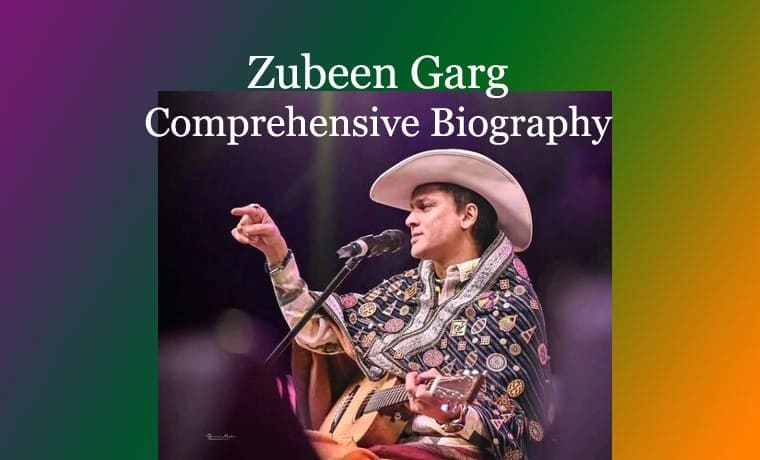Discover the inspiring life and legendary music journey of Zubeen Garg — the iconic Assamese singer behind the hit ‘Ya Ali.’ Explore his biography, songs, movies, achievements, and lasting legacy that continue to captivate millions.”
Zubeen Garg: Comprehensive Biography
Introduction
Zubeen Garg (born Zubeen Borthakur; 18 November 1972 – 19 September 2025) was one of India’s most loved musicians, singers, composers, actors, and filmmakers. He worked mainly in Assamese, Bengali, and Hindi music industries but also sang in more than 40 other languages, including English, Nepali, Tamil, Telugu, Marathi, Odia, Bhojpuri, Malayalam, and Sanskrit.
Known as a multi-instrumentalist, Zubeen played over 12 instruments such as guitar, drums, tabla, harmonium, keyboard, mandolin, and dhol. With a career spanning more than three decades, he recorded over 38,000 songs, making him one of the most influential and highest-paid singers from Assam.
Early Life and Family
Zubeen Garg was born on 18 November 1972 in Tura, Meghalaya, to Mohini Mohon Borthakur, a magistrate, poet, and lyricist (pen name Kapil Thakur), and Ily Borthakur, a singer. His family originally hailed from Jorhat, Assam.
He was first named Zubeen Borthakur, after the famous conductor Zubin Mehta, but later adopted the surname Garg from his Brahmin gotra, giving him a unique identity.
Music ran in his family—his mother was his first teacher, and his sister Jonkie Borthakur was a well-known singer and actress who tragically passed away in 2002. He later dedicated his album Xixhu to her memory. His younger sister Palme Borthakur became a professor of geography.
Education
Zubeen completed his matriculation at Tamulpur Higher Secondary School and later studied science at J.B. College and Karimganj College. He enrolled at B. Borooah College for a degree in science but left midway to pursue his passion for music.
Musical Journey
Early Training
Zubeen started singing at the age of three. His mother trained him in singing, while Pandit Robin Banerjee taught him tabla for 11 years. Later, Guru Ramani Rai introduced him to Assamese folk music. By his school years, he had already begun composing his own songs.
Beginning of Career (1992–1995)
Zubeen made his professional debut in 1992 with his Assamese album Anamika. Before this, he won a gold medal in a youth festival for his Western solo performance. His early albums like Xopunor Xur (1992), Junaki Mon (1993), Maya (1994), and Asha (1995) earned him recognition in Assam. His first Bihu album, Ujan Piriti, became a huge success.
Bollywood Breakthrough (1995–2013)
In 1995, Zubeen moved to Mumbai to try his luck in Bollywood. He released several Hindi albums such as Chandni Raat (1995), Chanda (1996), Jalwa (1998), and Jadoo (1999). He sang in movies like Dil Se (1998), Fiza (2000), Kaante (2002), and Jaal: The Trap (2003).
His biggest breakthrough came in 2006 with the song “Ya Ali” from the film Gangster, which won him the GIFA Award for Best Playback Singer.
Bengali Music Career (2003–2017)
Zubeen entered the Bengali music industry in 2003 with songs in the film Mon. He later became popular with hits like O Bondhure and Lagena Bhalo. His soulful voice made him a household name in Bengal as well.
Acting and Filmmaking Career
Apart from singing, Zubeen also acted and directed films. His first film was Tumi Mor Matho Mor (2000). He appeared in several Assamese films such as Prem Aru Prem (2002), Mon Jaai (2008), Mission China (2017), Kanchanjangha (2019), and Dr. Bezbaruah 2 (2023).
Live Performances
Zubeen was a beloved stage performer. He regularly sang at Bihu functions, cultural festivals, and concerts across Assam and abroad. He even performed in Trinidad and Tobago, becoming the first Assamese artist to headline a concert there.
Controversies
Throughout his career, Zubeen was known for his outspoken nature, which sometimes led to controversies. In 2019, he faced backlash for remarks on Brahmins, and in 2024, he created a stir by calling Krishna a human, not a god. Despite such incidents, his fan following remained strong.
Activism and Charity
Zubeen was deeply involved in social causes. Through his Kalaguru Artiste Foundation, he supported flood victims, donated medicines, and raised awareness on social issues. He also supported anti-CAA protests in Assam and during COVID-19, he offered his Guwahati home to be converted into a care center.
Personal Life
Zubeen married Garima Saikia, a fashion designer from Golaghat, Assam, on 4 February 2002. He described himself as irreligious, saying he did not believe in caste or religion.
Death
On 19 September 2025, Zubeen Garg tragically passed away at the age of 52 in Singapore. He drowned while swimming in the sea without a life jacket. Despite attempts to revive him, he was declared dead at Singapore General Hospital.
His funeral was held in Guwahati with full state honors on 23 September 2025, including a 21-gun salute. Thousands of fans and admirers gathered to pay their last respects.
Tributes and Legacy
Tributes poured in from across India. Prime Minister Narendra Modi, Opposition leader Rahul Gandhi, Assam CM Himanta Biswa Sarma, and West Bengal CM Mamata Banerjee mourned his loss. Singers like Papon, Shreya Ghoshal, Sunidhi Chauhan, Hariharan, AR Rahman, and many Bollywood celebrities also expressed grief.
In Assam, fans lit lamps and played his songs in his memory. His famous song “Mayabini Raatir Bukut”, which he once wished to be played after his death, became a tribute anthem across the state. 0 0 0
Zubeen Garg Data in Brief
| Category | Information |
|---|---|
| Full Name | Zubeen Borthakur (popularly known as Zubeen Garg) |
| Date of Birth | 18 November 1972 |
| Place of Birth | Tura, Meghalaya, India |
| Date of Death | 19 September 2025 |
| Place of Death | Singapore (drowned while swimming) |
| Age at Death | 52 years |
| Parents | Father: Mohini Mohon Borthakur (poet & magistrate) Mother: Ily Borthakur (singer) |
| Siblings | Sister: Jonkie Borthakur (singer, actress, died 2002) Sister: Palme Borthakur (professor) |
| Spouse | Garima Saikia (fashion designer, married in 2002) |
| Education | Studied science at J.B. College, Karimganj College, and B. Borooah College (dropped out to pursue music) |
| Occupation | Singer, Music Composer, Lyricist, Instrumentalist, Actor, Director, Filmmaker, Poet, Philanthropist |
| Music Career Start | 1992 (Debut Assamese album Anamika) |
| Major Languages Sung In | Assamese, Hindi, Bengali + 40 other languages (including English, Tamil, Telugu, Marathi, Nepali, Bhojpuri, Odia, Malayalam, Sanskrit) |
| Instruments Played | Guitar, Drums, Tabla, Harmonium, Keyboard, Mandolin, Dotara, Dhol, Harmonica, and others (12+ instruments) |
| Famous Bollywood Song | Ya Ali from Gangster (2006) |
| Albums (Popular) | Anamika (1992), Xopunor Xur (1992), Junaki Mon (1993), Maya (1994), Asha (1995), Zindagi (2007) |
| Acting Career | Films: Tumi Mor Matho Mor (2000), Mon Jaai (2008), Mission China (2017), Kanchanjangha (2019), Dr. Bezbaruah 2 (2023) |
| Charity Work | Founded Kalaguru Artiste Foundation, donated for flood victims, supported anti-CAA protests, offered home as COVID care center |
| Awards | GIFA Best Playback Singer (2006) for Ya Ali |
| Legacy | Recorded 38,000+ songs, regarded as one of Assam’s most influential musicians, received state funeral with 21-gun salute in 2025 |
Frequently Asked Questions about Zubeen Garg
1. Who was Zubeen Garg?
Zubeen Garg (1972–2025) was a legendary Indian playback singer, composer, lyricist, actor, filmmaker, and philanthropist. He was one of the most influential cultural icons of Assam and the Northeast. Though he mainly worked in Assamese, Hindi, and Bengali music, he sang in more than 40 languages, making him a versatile and widely respected artist. Over his 33-year career, he recorded more than 38,000 songs and became known as one of the most loved voices in India.
2. When and where was Zubeen Garg born?
Zubeen Garg was born on 18 November 1972 in Tura, Meghalaya, India, into an Assamese Brahmin family. His father, Mohini Mohon Borthakur, was a magistrate, poet, and lyricist, while his mother, Ily Borthakur, was a singer. His given name, Zubeen, was inspired by the famous music conductor Zubin Mehta.
3. How did Zubeen Garg start his music career?
Zubeen showed musical talent from a very young age. He began singing at the age of three and learned tabla for 11 years under Pandit Robin Banerjee. His debut Assamese album, Anamika (1992), marked his professional entry into the music industry. He soon became popular in Assam with albums like Xopunor Xur, Junaki Mon, and Maya. Later, he moved to Mumbai to pursue opportunities in Bollywood.
4. What was Zubeen Garg’s biggest Bollywood breakthrough?
Zubeen Garg’s biggest Bollywood breakthrough came in 2006 with the song “Ya Ali” from the film Gangster. The song became a massive hit across India and the Middle East. It not only gave him national recognition but also won him the GIFA Award for Best Playback Singer. Even today, Ya Ali remains one of his most iconic songs.
5. In how many languages did Zubeen Garg sing?
Zubeen Garg was a multilingual singer who recorded songs in more than 40 languages and dialects. Apart from Assamese, Hindi, and Bengali, he sang in English, Nepali, Tamil, Telugu, Malayalam, Odia, Bhojpuri, Marathi, Sanskrit, Kannada, Bodo, Karbi, Tiwa, Bishnupriya Manipuri, and many others. This versatility helped him connect with a wide audience across India and beyond.
6. Did Zubeen Garg also work as an actor and filmmaker?
Yes, Zubeen Garg was not just a singer but also a talented actor, director, and filmmaker. He made his directorial debut with Tumi Mor Matho Mor in 2000. Some of his notable films as an actor include Prem Aru Prem (2002), Mon Jaai (2008), Mission China (2017), Kanchanjangha (2019), and Dr. Bezbaruah 2 (2023). His films often reflected social issues, patriotism, and Assamese culture.
7. What social causes did Zubeen Garg support?
Zubeen Garg was well-known for his philanthropy and activism. He founded the Kalaguru Artiste Foundation to help people in need. He donated clothes, medicines, and money to flood-affected people in Assam. During the Anti-CAA movement, he became one of the strongest non-political voices against the law. In the COVID-19 pandemic, he offered his house in Guwahati to be converted into a COVID Care Centre. He also raised funds through football matches and concerts.
8. Who was Zubeen Garg’s wife?
Zubeen Garg married Garima Saikia, a fashion designer from Golaghat, Assam, on 4 February 2002. The couple remained together until his death in 2025. Garima often supported Zubeen in his career and charity work and stood by him during controversies and health challenges.
9. How did Zubeen Garg die?
Zubeen Garg tragically passed away on 19 September 2025 at the age of 52 in Singapore. He drowned while swimming in the sea without a life jacket. Although he was rushed to Singapore General Hospital, doctors could not save him. His funeral was held with full state honors in Guwahati on 23 September 2025, attended by thousands of fans and dignitaries.
10. What is Zubeen Garg’s legacy?
Zubeen Garg left behind an unmatched legacy in Indian and Assamese music. With over 38,000 recorded songs, performances worldwide, and contributions to film and culture, he became a true legend. His famous song “Mayabini Raatir Bukut” was played as a tribute after his death, just as he had once wished. Political leaders, Bollywood celebrities, and millions of fans paid homage, proving his place as the voice of a generation. His legacy continues to inspire young artists in Assam, Bengal, Bollywood, and beyond. 0 0 0
You May Like: Tavernier | Travels in India | A Review.
Zubeen Garg: Key Data & Facts
- Full Name: Zubeen Borthakur (popularly known as Zubeen Garg)
- Date of Birth: 18 November 1972
- Place of Birth: Tura, Meghalaya, India
- Parents:
- Father – Mohini Mohon Borthakur (Poet & Magistrate)
- Mother – Ily Borthakur (Singer)
- Spouse: Garima Saikia (married on 4 February 2002)
- Profession: Playback Singer, Music Composer, Lyricist, Actor, Filmmaker, Philanthropist
- Debut Album: Anamika (1992, Assamese)
- Bollywood Breakthrough: Ya Ali (Film: Gangster, 2006)
- Notable Films (as actor/director):
- Tumi Mor Matho Mor (2000, director)
- Mon Jaai (2008, actor)
- Mission China (2017, actor & director)
- Kanchanjangha (2019, actor & director)
- Languages Sung In: Over 40 languages including Assamese, Hindi, Bengali, English, Nepali, Tamil, Telugu, Marathi, Odia, Bhojpuri, Malayalam, Sanskrit.
- Total Songs Recorded: More than 38,000
- Awards: GIFA Award for Best Playback Singer (for Ya Ali), Prag Cine Awards, and many Assamese music honors.
- Social Work: Founded Kalaguru Artiste Foundation; supported Assam flood relief, voiced against CAA, and donated for COVID relief.
- Death: 19 September 2025 in Singapore (drowning accident, age 52)
- Legacy Song: Mayabini Raatir Bukut became a tribute anthem after his death. 0 0 0











